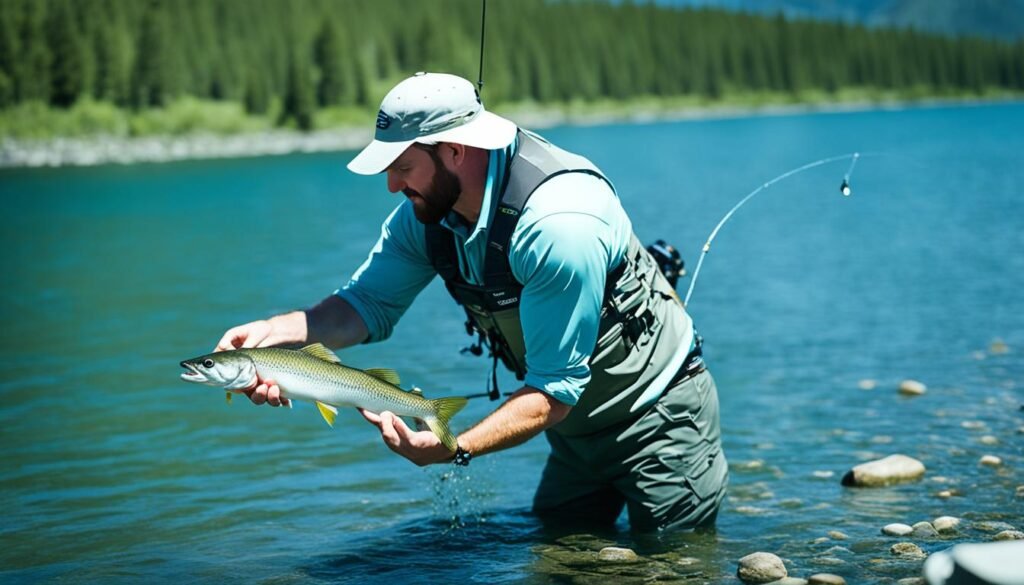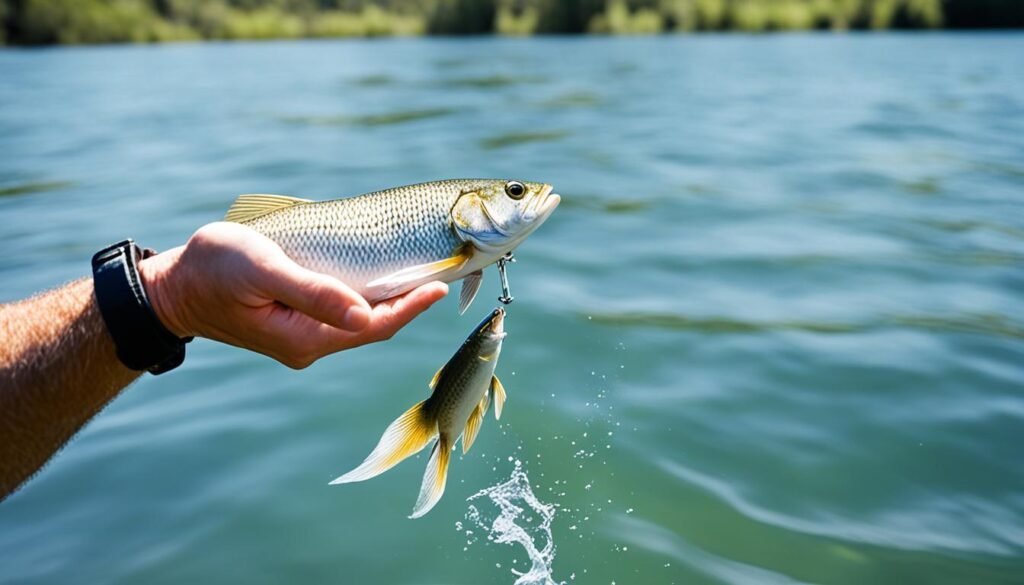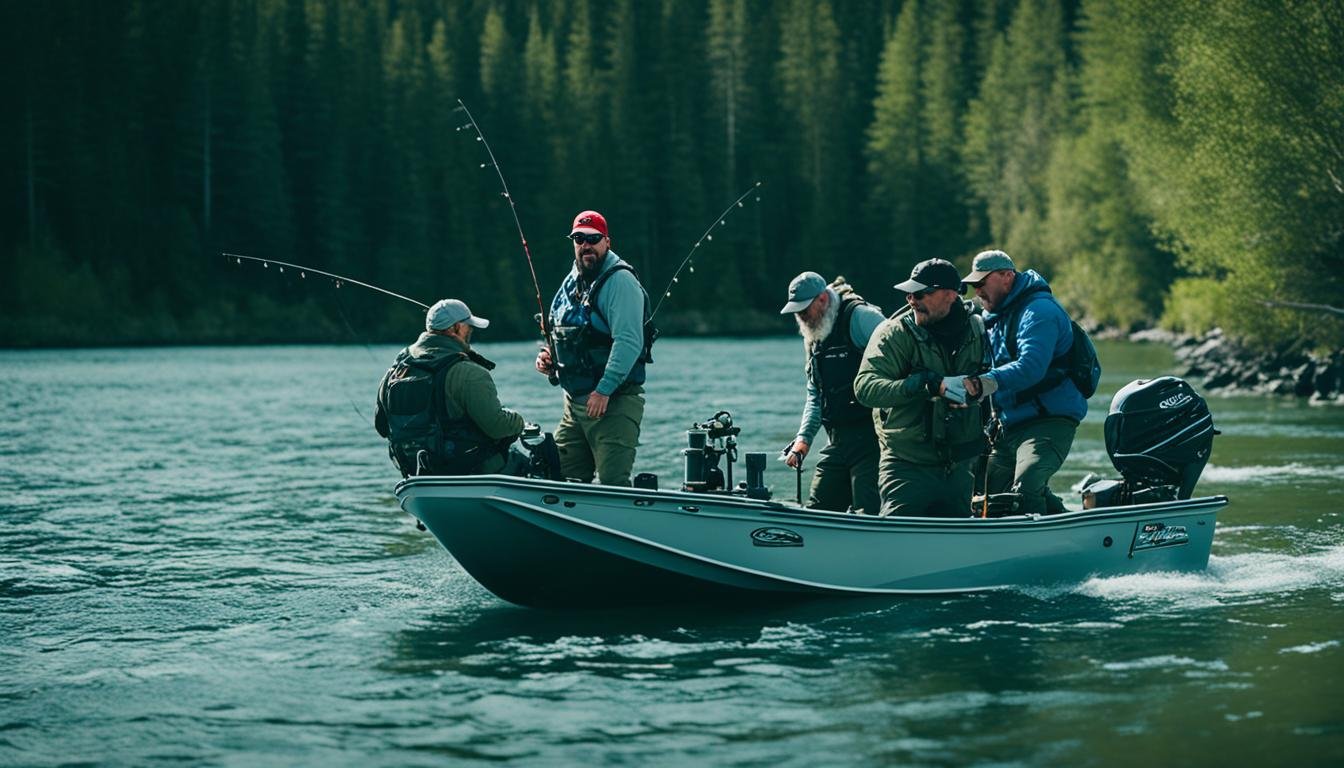Ever wondered about the unspoken rules of fishing?
Fishing etiquette ensures everyone can enjoy angling while protecting our natural resources. Let’s explore the essential etiquette for Canadian anglers.
Canada boasts over 400,000 anglers enjoying its waters. We must uphold high angling ethics to preserve our fish stocks and habitats. Recreational fishing brings joy, but it can harm the environment if not done carefully.
This guide covers respecting fellow anglers and the environment. We’ll discuss handling fish and following local rules. By embracing these practices, we can ensure a sustainable future for our beloved sport.
Key Takeaways about Essential Fishing Etiquette for Canadian Anglers
- Understand the importance of maintaining appropriate distances and following rotational angling systems to ensure equal access for all anglers.
- Learn how to minimize environmental impact by avoiding disturbances to vegetation, properly disposing of waste, and being mindful of boating speeds.
- Discover the proper techniques for handling and releasing fish to promote their wellbeing and support catch-and-release conservation efforts.
- Familiarize yourself with local fishing regulations, including licensing requirements, catch limits, and seasonal closures, to ensure responsible angling.
- Embrace the ethos of respecting both fellow anglers and the natural environment, fostering a harmonious and sustainable fishing experience for all.
Respecting Other Anglers
Respect your fellow anglers’ space when fishing in crowded areas. Avoid setting up too close to other huts or boats. Give others room without sacrificing your fishing experience.
Be mindful when driving on ice. Don’t run over or cover up other anglers’ gear. Maintaining distance and being courteous creates a positive fishing environment.
Maintaining Safe Distances
Practice proper crowding etiquette and boat ramp manners for a harmonious fishing experience. Leave space between spots and be mindful of your movements. This ensures safety and maintains the peace many seek on the water.
Rotational Angling
Rotational angling encourages everyone to fish sequentially on a river stretch. It gives equal chances to fish prime spots. This prevents a few anglers from hogging the best areas.
Basic rules include not entering water downstream of others and leaving space between anglers. Return to the pool’s head after catching a fish. This practice is common on Canada’s classified waters.
Respecting angling ethics ensures a great experience for all. It fosters a positive fishing community through safe distances and rotational angling.
Preserving the Environment
Anglers must protect the ecosystems we fish in. We should prevent invasive species transfer and avoid littering. Always pack out everything and leave the area cleaner than you found it.
Follow fishing regulations and laws. Keep noise levels low to avoid spooking fish. Get landowner permission when fishing on private property.
Properly dispose of fishing-related trash. Remove litter, including discarded fishing line and bait containers. This keeps the environment clean and safe for wildlife.
Be mindful of sensitive habitats. Give the area quiet spells to improve fishing success. This allows fish to come out and feed.
Fishing regulations protect fish and preserve the environment. They ensure future generations can enjoy the sport. Careful handling of spawning fish is crucial.
Use lead-free equipment and non-toxic sinkers. Clean gear between locations to prevent spreading invasive species. These practices reduce environmental impact.
By adopting conservation practices and showing invasive species awareness, anglers protect aquatic ecosystems. Following the leave no trace principle and proper fish waste disposal maintains healthy fishing waters.
“99 times out of 100, if someone is told that a spot is being fished, they will move and not cause any problems.”
Lawrence Bay Lodge emphasizes sustainable fishing practices. They promote catch and release for larger fish. The lodge uses angling techniques with minimal environmental impact.
Responsible fishing ensures a healthy environment for future generations. By following ethical practices, we protect the waters we cherish.
Fishing Etiquette

Canadian anglers cherish fishing for more than just catching fish. We value ethical principles that sustain our fisheries for future generations. Fishing etiquette goes beyond respecting fellow anglers. It includes our duty to the environment and fishing regulations.
Respecting property is a key part of fishing etiquette. Always ask permission before fishing on private land or Indigenous territories. Leave natural areas undisturbed to protect the ecosystem’s balance.
Understanding fishing regulations is vital for ethical angling. Daily quotas, size limits, and seasonal closures protect fish populations. Anglers must know and follow these rules. Report any violations through the Report All Poachers and Polluters (RAPP) hotline.
| Fishing Etiquette Practices | Compliance Rates |
|---|---|
| Asking permission before accessing private property | 80% |
| Adhering to daily catch limits and size restrictions | 75% |
| Reporting violations through the RAPP hotline | 60% |
| Cleaning and drying fishing equipment to prevent invasive species spread | 85% |
By following fishing etiquette, Canadian anglers help preserve our aquatic ecosystems. Our actions ensure fishing remains a beloved pastime for future generations. Let’s work together to protect our waters and fish populations.
“Fishing is not just about catching fish, it’s about respecting the sport, the environment, and the regulations that govern it. As anglers, we have a responsibility to uphold the highest standards of ethical conduct.”
Handling and Releasing Fish

Careful fish handling is vital for catch-and-release anglers. Play and release fish quickly, keeping them in water as much as possible. Use tools like needle-nose pliers to gently remove hooks.
Single barbless hooks are less damaging to fish. If a fish is deeply hooked or bleeding, keep it as part of your quota. This helps maintain healthy fish populations and ensures long-term sport sustainability.
Catch-and-Release Practices
To successfully release fish, follow these best practices:
- Avoid fighting the fish to exhaustion, as this can reduce its chances of survival.
- Cut the line close to the hook if the fish has swallowed the hook, rather than attempting to remove it.
- Minimize the time the fish spends out of the water, aiming for less than 60 seconds.
- Support the fish’s weight along its body, rather than suspending it by the lip or mouth.
- Resuscitate sluggish fish by facing them into the current, allowing them to regain their strength before release.
For deep-water catches, use recompression tools like descender devices. These help release fish at the right depth and prevent barotrauma, a condition caused by rapid pressure changes.
| Technique | Description | Effectiveness |
|---|---|---|
| Circle hooks, barbless hooks, or hooks with crimped barbs | These hook types are less damaging to the fish and can increase survival rates. | Increased survival rates compared to traditional J-hooks. |
| Non-stainless steel hooks | Hooks that corrode over time can prevent long-term damage to fish or wildlife. | Reduces the risk of hooks remaining embedded in the fish. |
| Venting for barotrauma | A method used to release fish that have suffered from barotrauma, a condition caused by rapid changes in water pressure. | Can be an effective alternative for fish that cannot be quickly released at depth. |
Good catch-and-release practices help ensure healthy fish populations. Responsible fish handling and minimizing stress are key to achieving this goal. These actions support the long-term sustainability of fishing.
10 Essential Fishing Etiquette for Canadian Anglers
Respect the Environment
- Pack out all trash, including fishing line and hooks
- Use biodegradable lures when possible
- Avoid disturbing wildlife and vegetation
Follow Regulations
- Obtain proper fishing licenses
- Adhere to catch limits and size restrictions
- Know and respect seasonal fishing closures
Courtesy on the Water
- Maintain a respectful distance from other anglers
- Avoid making excessive noise
- Share productive spots when appropriate
Proper Fish Handling
- Use appropriate gear to minimize fish stress
- Wet hands before handling fish
- Release fish quickly and carefully if not keeping them
Boat Etiquette
- Observe no-wake zones
- Yield right of way to smaller watercraft
- Be mindful of your wake near shorelines or other anglers
Fishing Spot Etiquette
- Don’t crowd other anglers
- Ask permission before approaching someone else’s spot
- Rotate through fishing holes in popular areas
Catch and Release Best Practices
- Use barbless hooks when possible
- Minimize time fish spend out of water
- Support the fish’s body when taking photos
Respect Private Property
- Always obtain permission before fishing on private land
- Close gates and respect landowners’ rules
Share Knowledge Responsibly
- Avoid sharing specific locations of sensitive fishing spots online
- Educate new anglers about conservation and etiquette
Be Prepared
- Carry all necessary safety equipment
- Know basic first aid and CPR
- Be aware of weather conditions and potential hazards
By following these guidelines, Canadian anglers can ensure a positive experience for themselves and others while preserving the fishing environment for future generations.
Conclusion
Fishing etiquette is vital for responsible angling in Canada. It helps preserve waterways and protect fish populations. By following these guidelines, we ensure everyone can enjoy fishing etiquette for years to come.
Safe distances and sharing water are key practices. Handling fish carefully and leaving no trace show respect for nature. These actions contribute to sustainable angling and respect for fellow anglers.
Proper conservation is crucial for sustainable fisheries. Know the latest rules and regulations. Prioritize the well-being of caught fish. This keeps our waterways healthy for future generations.
Fishing etiquette goes beyond following rules. It reflects our duty to the environment and other anglers. Ethical practices inspire others to do the same. This creates a culture of stewardship benefiting everyone.
For an overview about Fishing for Beginners in Canada, please check this guide.
FAQs about Essential Fishing Etiquette for Canadian Anglers
Is it OK to say good luck to a fisherman?
While some anglers consider it bad luck to say “good luck” before a fishing trip, many others appreciate the sentiment. Instead of “good luck,” you can use phrases like:
“Tight lines!”
“Hope you catch a big one!”
“Wishing you a great day on the water!”
These alternatives are generally well-received in the fishing community.
What is the ethics of angling?
The ethics of angling include:
- Respecting fish and their environment
- Practicing catch and release when appropriate
- Following local fishing regulations and limits
- Properly disposing of fishing line and other waste
- Using appropriate gear to minimize harm to fish
- Educating others about responsible fishing practices
- Reporting illegal fishing activities
- Supporting conservation efforts
What do you need to fish in Canada?
To fish in Canada, you typically need:
- A valid fishing license for the province or territory
- Appropriate fishing gear (rod, reel, lures, bait)
- Knowledge of local fishing regulations
- Safety equipment (life jacket, first aid kit)
- Weather-appropriate clothing
- Insect repellent and sunscreen
- A conservation card (in some provinces)
- A boat license if using a motorized vessel
What is the best month for fishing in Canada?
The best month for fishing in Canada varies depending on the region and target species. Generally:
- June to August: Peak season for most types of fishing
- April to May: Excellent for spring fishing as waters warm
- September to October: Great for fall fishing, especially salmon
- December to March: Prime time for ice fishing
What are the 3 main fishing areas in Canada?
The three main fishing areas in Canada are:
- Pacific Coast: British Columbia’s coastal waters and rivers
- Atlantic Coast: Newfoundland, Nova Scotia, New Brunswick, and Prince Edward Island
- Inland Waters: The Great Lakes, and numerous lakes and rivers across the country
Which Canadian province has the best fishing?
While fishing quality is subjective and depends on personal preferences, some provinces known for exceptional fishing include:
- British Columbia: Renowned for salmon and halibut fishing
- Ontario: Home to the Great Lakes and numerous inland lakes
- Quebec: Offers diverse freshwater fishing opportunities
- Newfoundland and Labrador: Known for Atlantic salmon and trophy brook trout
- Each province offers unique fishing experiences, so the “best” depends on your target species and preferred fishing style.
What is fishing etiquette, and why is it important?
Fishing etiquette involves unwritten rules for anglers to follow. It ensures everyone can enjoy the sport while protecting nature. Good etiquette fosters a positive and sustainable fishing community.
How can anglers respect other anglers when fishing in crowded areas?
Anglers should avoid setting up too close to others. Give other anglers plenty of room to fish comfortably. Be mindful when operating vehicles on the ice to avoid disturbing others.
Maintaining a safe distance and being courteous helps create a positive fishing environment.
What is rotational angling, and how does it promote fairness on the water?
Rotational angling lets anglers fish sequentially, giving everyone a chance at prime spots. It involves not entering the water downstream of another angler. Leave enough room between anglers and return to the line after catching a fish.
How can anglers help preserve the environment and protect ecosystems?
Anglers should prevent transferring aquatic species or weeds. Avoid littering or contaminating the water. Properly dispose of fish waste and pack out everything brought in.
Leave the area cleaner than you found it to protect the environment.
What are some key fishing etiquette rules related to regulations and property rights?
Always ask permission before entering private property, including Indigenous land. Know the regulations on daily quotas, size limits, and tackle restrictions. Be aware of seasonal closures and report any violations you observe.
How should anglers handle and release fish to ensure their survival?
For catch-and-release, play and release fish quickly. Keep the fish in water and use tools like pliers to remove hooks gently. Use single barbless hooks to minimize stress on the fish.
Retain deeply hooked or bleeding fish to increase their chances of survival.
Source Links
- https://www2.gov.bc.ca/assets/gov/sports-recreation-arts-and-culture/outdoor-recreation/fishing-and-hunting/freshwater-fishing/ethics_for_anglers.pdf
- https://www.lawrencebay.com/fishing-etiquette-the-dos-donts-of-the-water/
- https://deneki.com/2013/05/spey-fishing-etiquette/
- https://www.discoverboating.com/resources/respectful-angler-tips
- https://www.gofishbc.com/learn/fishing-tips/education/responsible-fishing-a-guide-to-angler-etiquette
- https://wdfw.medium.com/basic-angling-etiquette-tips-to-share-the-water-70d2b11afd3
- http://northwestfishingreports.com/Articles/Details/891
- https://baitium.com/blogs/news/fishing-etiquette-101
- https://www.lawrencebay.com/5-ways-you-can-practice-sustainable-fishing/
- https://www.gofishbc.com/learn/fishing-tips/education/responsible-fishing-a-guide-to-angler-etiquette/
- https://1source.basspro.com/news-tips/fishing-information/4810/6-dos-and-donts-fishing-etiquette
- https://tenkaraangler.com/2024/06/19/the-unwritten-rules-of-fishing-etiquette/
- https://www.fisheries.noaa.gov/national/resources-fishing/catch-and-release-fishing-best-practices
- https://www.destinationontario.com/en-ca/articles/how-hold-fish-for-picture-then-safely-release-it
- https://www.flyfisherman.com/editorial/Best-Practices-for-Catch-and-Release-Trout-Fishing/384148
- https://www.marinemax.com/connect/lifestyles/from-the-helm/boating-tips/fishing-etiquette
- https://blog.clas.app/mastering-fishing-etiquette-tips-for-responsible-anglers/
- https://womensfishingnetwork.com/ice-fishing-etiquette/
